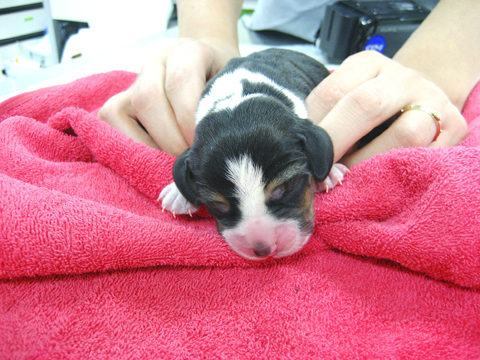South Korean scientists said on Wednesday they have created dogs that glow red by using a cloning technique that opens the way for research into human diseases.
The four cloned beagles known as Ruppy — Ruby Puppy — contain a fluorescent protein that makes them glow red under ultraviolet light. Even in daylight, their skin and claws appear pink.
Scientists said the creation of the glowing pups showed that it would be possible to implant genes related to human diseases into dogs for research purposes.

PHOTO: AP
“They are the world’s first transgenic dogs,” said Lee Byeong-chun, a professor who leads the Seoul National University (SNU) team.
“This means we’ll be able to switch genes in dogs for genes related to human diseases such as Parkinson’s Disease for research,” he said, adding that dogs suffer from 224 illnesses that also afflict humans.
The team created the beagles by infecting dog fibroblast cells with a virus that inserted the fluorescent gene into the cell nucleus.
The nucleus was then transferred to another dog’s egg cell whose nucleus had been removed. The cloned embryo was implanted in a surrogate mother.
Six female cloned beagles, all with a gene producing a fluorescent protein, were born in December 2007. Two died and four survived.
The experiment was only publicized this month.
“Fluorescent cats, mice and monkeys have been produced but dogs remain one of the most difficult animals for transgenic engineering, while they have many diseases similar to humans,” said Park Se-pill, a cloning expert.
“This is an important achievement that paves the way for gene-targeting in dogs,” Park said.
In December 2007 other South Korean scientists claimed a world first by manipulating a fluorescent protein gene to clone glowing cats.
Lee’s team earlier produced the world’s first cloned dog, Snuppy.
Lee was an aide to Hwang Woo-suk, who was hailed as a national hero until an inquiry ruled that some of Hwang’s work on cloning embryonic human stem cells was fake.
However, Lee’s work in creating Snuppy (Seoul National University puppy) has been verified by the university and other authorities.

BOMBARDMENT: Moscow sent more than 440 drones and 32 missiles, Volodymyr Zelenskiy said, in ‘one of the most terrifying strikes’ on the capital in recent months A nighttime Russian missile and drone bombardment of Ukraine killed at least 15 people and injured 116 while they slept in their homes, local officials said yesterday, with the main barrage centering on the capital, Kyiv. Kyiv City Military Administration head Tymur Tkachenko said 14 people were killed and 99 were injured as explosions echoed across the city for hours during the night. The bombardment demolished a nine-story residential building, destroying dozens of apartments. Emergency workers were at the scene to rescue people from under the rubble. Russia flung more than 440 drones and 32 missiles at Ukraine, Ukrainian President Volodymyr Zelenskiy

COMPETITION: The US and Russia make up about 90 percent of the world stockpile and are adding new versions, while China’s nuclear force is steadily rising, SIPRI said Most of the world’s nuclear-armed states continued to modernize their arsenals last year, setting the stage for a new nuclear arms race, the Stockholm International Peace Research Institute (SIPRI) said yesterday. Nuclear powers including the US and Russia — which account for about 90 percent of the world’s stockpile — had spent time last year “upgrading existing weapons and adding newer versions,” researchers said. Since the end of the Cold War, old warheads have generally been dismantled quicker than new ones have been deployed, resulting in a decrease in the overall number of warheads. However, SIPRI said that the trend was likely

‘SHORTSIGHTED’: Using aid as leverage is punitive, would not be regarded well among Pacific Island nations and would further open the door for China, an academic said New Zealand has suspended millions of dollars in budget funding to the Cook Islands, it said yesterday, as the relationship between the two constitutionally linked countries continues to deteriorate amid the island group’s deepening ties with China. A spokesperson for New Zealand Minister of Foreign Affairs Winston Peters said in a statement that New Zealand early this month decided to suspend payment of NZ$18.2 million (US$11 million) in core sector support funding for this year and next year as it “relies on a high trust bilateral relationship.” New Zealand and Australia have become increasingly cautious about China’s growing presence in the Pacific

Indonesia’s Mount Lewotobi Laki-Laki yesterday erupted again with giant ash and smoke plumes after forcing evacuations of villages and flight cancelations, including to and from the resort island of Bali. Several eruptions sent ash up to 5km into the sky on Tuesday evening to yesterday afternoon. An eruption on Tuesday afternoon sent thick, gray clouds 10km into the sky that expanded into a mushroom-shaped ash cloud visible as much as 150km kilometers away. The eruption alert was raised on Tuesday to the highest level and the danger zone where people are recommended to leave was expanded to 8km from the crater. Officers also